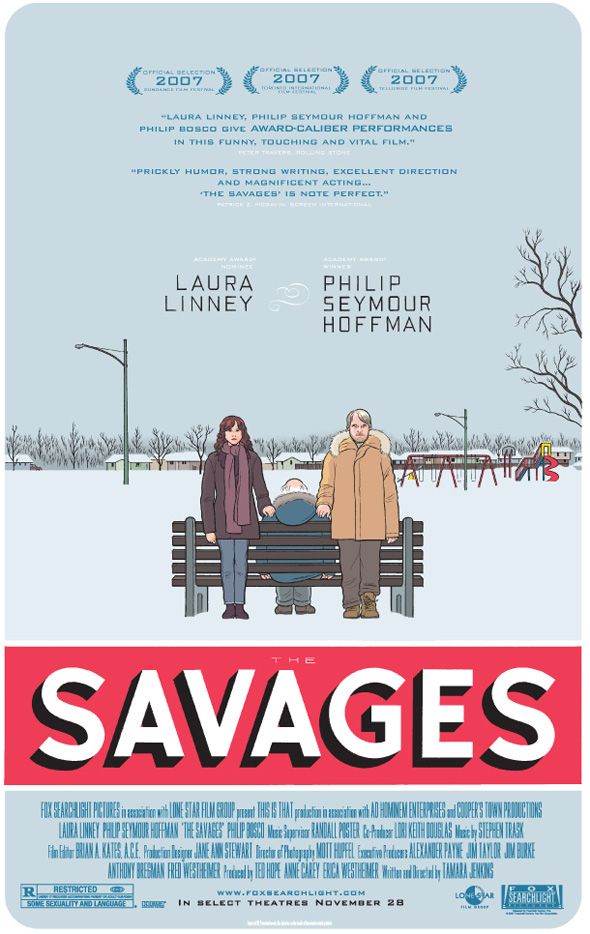

Anyone with adult siblings understands the complexity of these relationships. The Savages, one of the underrated movies of 2007, explores familial relationships as an acerbic comedy with a very real social commentary by writer-director Tamara Jenkins.
Wendy Savage (Laura Linney), a freelance writer applying for grants to write a play, receives a message on her answering machine. Her dad Lenny (Philip Bosco) is descending into dementia in retirement central, Sun City Arizona. Add to that his long-term girlfriend just died, and Wendy has a family mess on her hands. She calls her brother Jon (Philip Seymour Hoffman), who is a professor of drama in Buffalo, New York. Estranged from their father, they have not spoken to him in decades. Perhaps abused, certainly abandoned, they have spent their adult lives trying to deal with a damaged childhood -- "Maybe dad didn't abandon us. Maybe he just forgot who we were."
Given the crisis, both Wendy and Jon fly into Arizona, and immediately find themselves picking up where they left off from childhood -- sibling bickering. As Wendy, the neurotic younger sister starts to criticize Jon and his casual, almost cavalier, approach he says, "This is not therapy, this is real life." Their dialog is so real, it could come from the back seat of my Honda minivan.
 Wendy and Jon come to find Lenny in restraints in the hospital -- for his own safety. It is clear he cannot live in his dead girlfriend's house: her kids want to sell it. It is also clear he cannot live on his own. It falls on his kids, no longer part of his life, to become involved. It is their obligation, their responsibility.
Wendy and Jon come to find Lenny in restraints in the hospital -- for his own safety. It is clear he cannot live in his dead girlfriend's house: her kids want to sell it. It is also clear he cannot live on his own. It falls on his kids, no longer part of his life, to become involved. It is their obligation, their responsibility. As Jenkins develops this theme, she slowly reveals the two main characters. Their upbringing has caused them to fear intimacy. Both are struggling in relationships. Jon won't marry the woman who loves him for fear of abandonment by her. Wendy, on the other hand, is sexually involved with a married man in her apartment complex, but it is physical rather than emotional intimacy that she shares with him. Neither can sustain a long-term relationship. Both are struggling with achievement. Jon is a PhD working on a book that he can't finish. Wendy wants to write a play but cannot get the support she needs to write.
 Jon, being the older and employed child, takes the responsibility of finding a nursing home. But it is not picture perfect. Wendy is the guilt-ridden child, who cannot bear that her dad will be in a place that smells, that reeks of decaying life and imminent death. She wants him to be in a "retirement home" where there is classical music and sweet smelling flowers -- at least that's what the DVD promo materials from these make them look like. And burdened by guilt, Wendy moves in with slobbish Jon, a sort of siblings Odd Couple.
Jon, being the older and employed child, takes the responsibility of finding a nursing home. But it is not picture perfect. Wendy is the guilt-ridden child, who cannot bear that her dad will be in a place that smells, that reeks of decaying life and imminent death. She wants him to be in a "retirement home" where there is classical music and sweet smelling flowers -- at least that's what the DVD promo materials from these make them look like. And burdened by guilt, Wendy moves in with slobbish Jon, a sort of siblings Odd Couple.Where Away from Her dealt with the loss of mental acuity of a spouse who had to enter a nursing home, The Savages looks at a similar issue from the adult child's perspective. Faced with the dementia and dying of their dad, these two siblings come to terms with one another, growing in their understanding of themselves at the same time. It takes this encounter with death and responsibility for them to face their own demons. We cannot run all our lives.
I write as one who has a younger brother, Kevin, with whom I have little in common. We live on different continents and communicate so infrequently you could mark your leap year calendar by our calls. This movie caused me to reflect on the personal loss I experience from a loss of relationship with him and his family. Indeed, it is ironic that Philip Seymour Hoffman bears a close resemblance to my brother, so much so that every time I see Hoffman in a movie I think of Kevin. It is indeed sad that I see Hoffman but cannot connect to my brother.
The Savages puts us face to face with the reality of dealing with dying parents. With medicine and technology extending physical life well into the 70s, 80s, even 90s, we face quality of life issues as well as caregiving issues. Whose responsibility is it to care for an ailing parent? Who will care for them? When the one who changed our diapers when we were kids now wears adult diapers who will change them? It seems common practice to ship them off to antiseptic-smelling nursing homes where strangers will do this dirty work. Is that a good thing? Perhaps so. Perhaps not. We may all have to face decisions like this in the coming years as our parents' health deteriorates. Health may deteriorate but what is fundamental is to maintain healthy relationships.
Copyright 2008, Martin Baggs

No comments:
Post a Comment